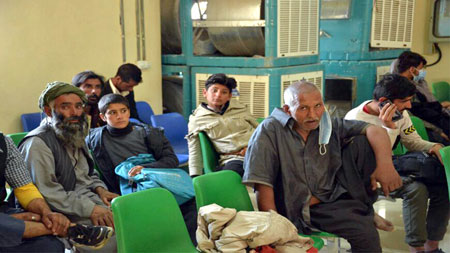According to the information of the Ministry of Refugees and Repatriation (MoRR), in the past week nearly 6,000 Afghan immigrants have come to Afghanistan from Iran, of which 5,600 were forcibly deported.
“We have asked countries, especially Iran, where Afghan immigrants live to respect the rights of Afghan immigrants based on the Islamic and international law,” said Mohammad Arsalah Kharoti, deputy of the MoRR.
Officials of the Ministry asked Iran and all other countries to respect the rights of refugees and to address their problems.
Many young people are reportedly forced to travel abroad due to economic issues and a lack of employment.
“Two times I went to Iran, and they deported me. I have to go to Iran, there is no work here in Afghanistan,” said Noor Mohammad, an immigrant forcibly deported from Iran.
“Due to economic challenges and lack of employment, I want to go to Iran,” said Abdul Sami, a resident of Kapisa.
Experts on immigration issues urged the Iranian government and refugee protection agencies to stop forcible deportations of Afghan refugees from Iran.
“Since the census process for those Afghans who do not have legal documents started in Iran, the forced deportation has restarted,” said Asifa Stanekzai, an expert on immigrant issues.
Based on the figures provided by the Ministry of Refugees and Repatriation (MoRR), in addition to Iran, 66 families have returned to Afghanistan from Pakistan.
Meanwhile, more than one million Afghans have migrated over the past four months, the New York Times reported. Most of the migrants crossed border areas into Iran and Pakistan
The head of a private transportation industry said that around 4,000 people are heading to Iran on daily basis.
Mohammad Ayoub, 52, and his family of five are traveling to Iran.
“The problems are obvious to everyone. There is poverty, unemployment and there is no educational opportunity for the youth,” he said.
“I want to go because I want my children–two boys and two daughters–to continue their studies in a good environment,” he added.
He worked at the Ministry of Higher Education for 10 years. Ayoubi said life has become difficult for him and his family in Afghanistan, and, therefore, he wants to travel to Iran.
Many of the travelers in Herat province, the transportation industrial’s heads said, are people who seek to cross the border to Iran.
They said some also travel to Pakistan.
“Every day, we take 3,500 to 4,000 people from here (Kabul) to Kandahar, Nimroz and Herat provinces,” said Ismail Jawanmard Amerkhel, head of a transportation company.
The New York Times said the mass migration has raised alarms in the region as well as Europe about a repeat of the 2015 migrant crisis, when more than a million people, mostly Syrians, sought asylum in Europe.
“Though many are choosing to leave because of the immediate economic crisis, the prospect of long-term Taliban governance — including restrictions on women and fears of retribution — has only added to their urgency, the report reads.
Refugee rights defenders in Iran expressed concerns over the status of Afghan refugees in Iran.
“The Afghan refugees in Iran are facing various challenges such as lack of access to work and refugee identification cards. A refugee is always at risk of being back deported,” said Naqibullah Rasikh, a refugee rights activist.
The Islamic Emirate said efforts are underway to tackle the economic and humanitarian crisis in Afghanistan.
“The statistics of the Islamic Emirate show that between 1,500 to 2,000 people are going to Iran from Afghanistan on a daily basis,” said Bilal Karimi, deputy spokesman for the Islamic Emirate.
Many of the migrants entering Iran are seeking to cross the borders of Turkey and from there go on to Europe for asylum.—Tolonews










